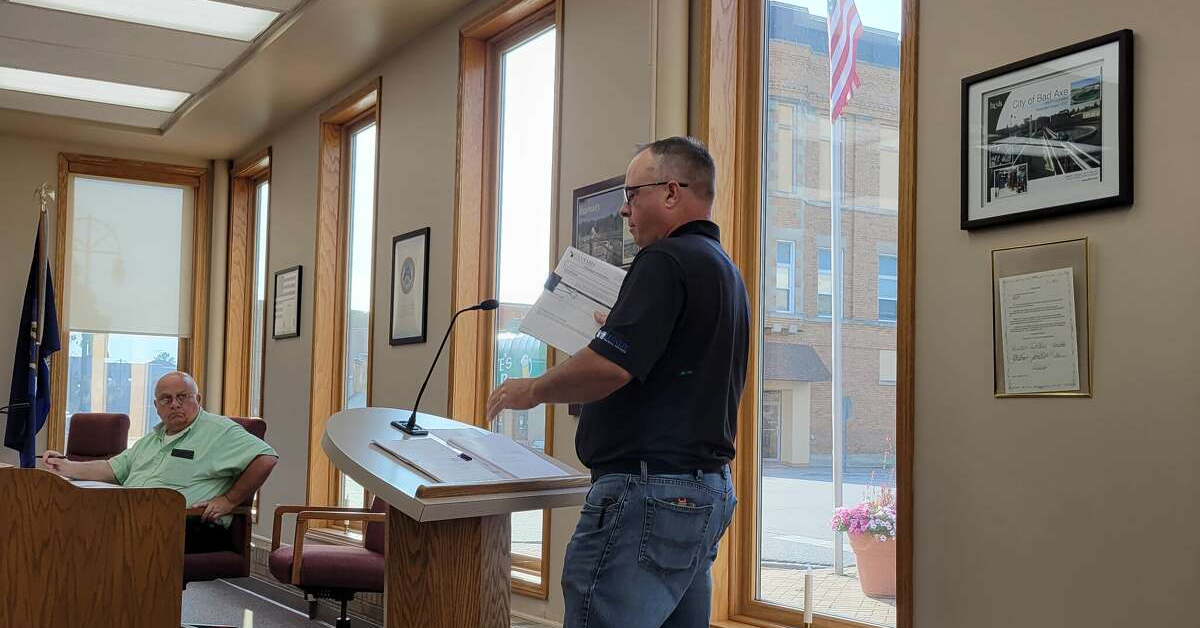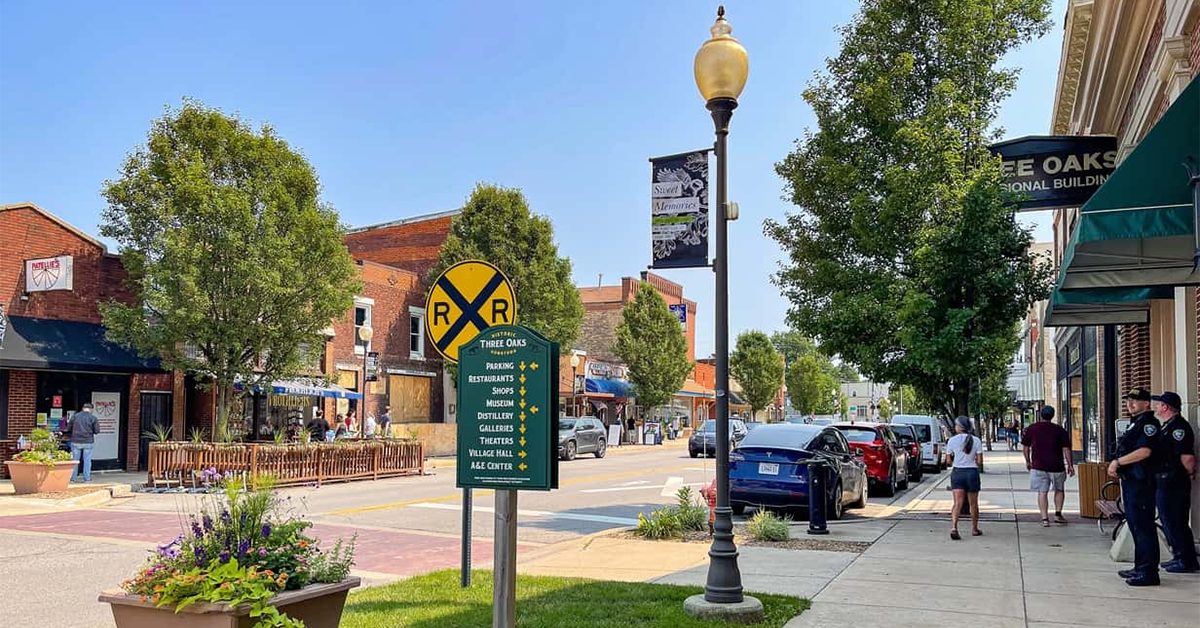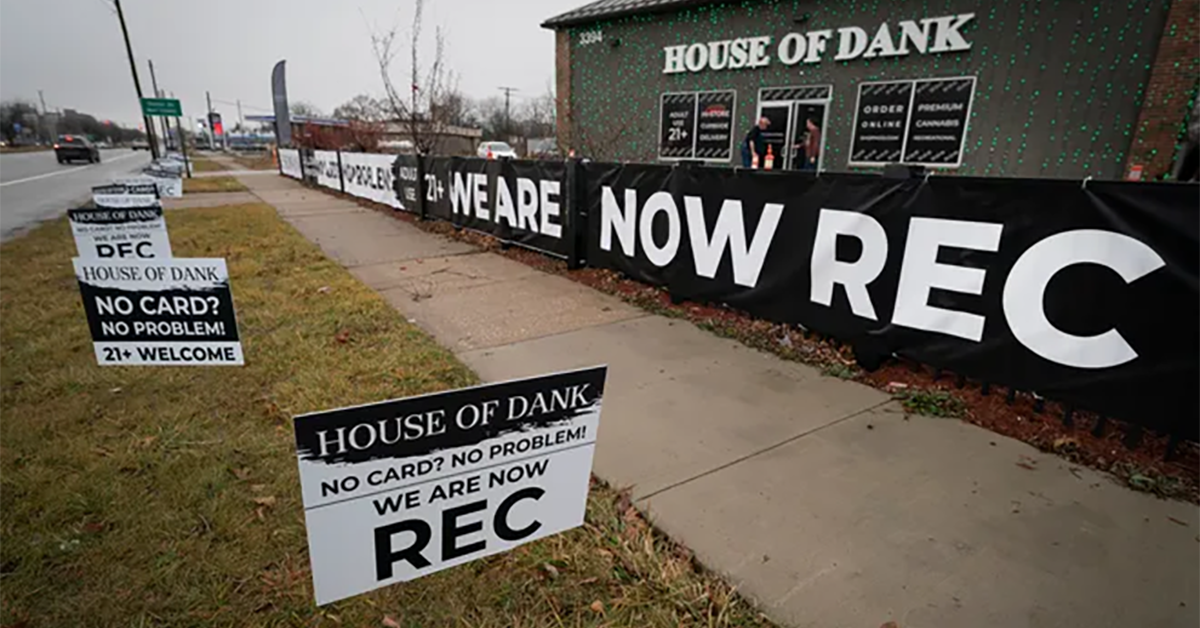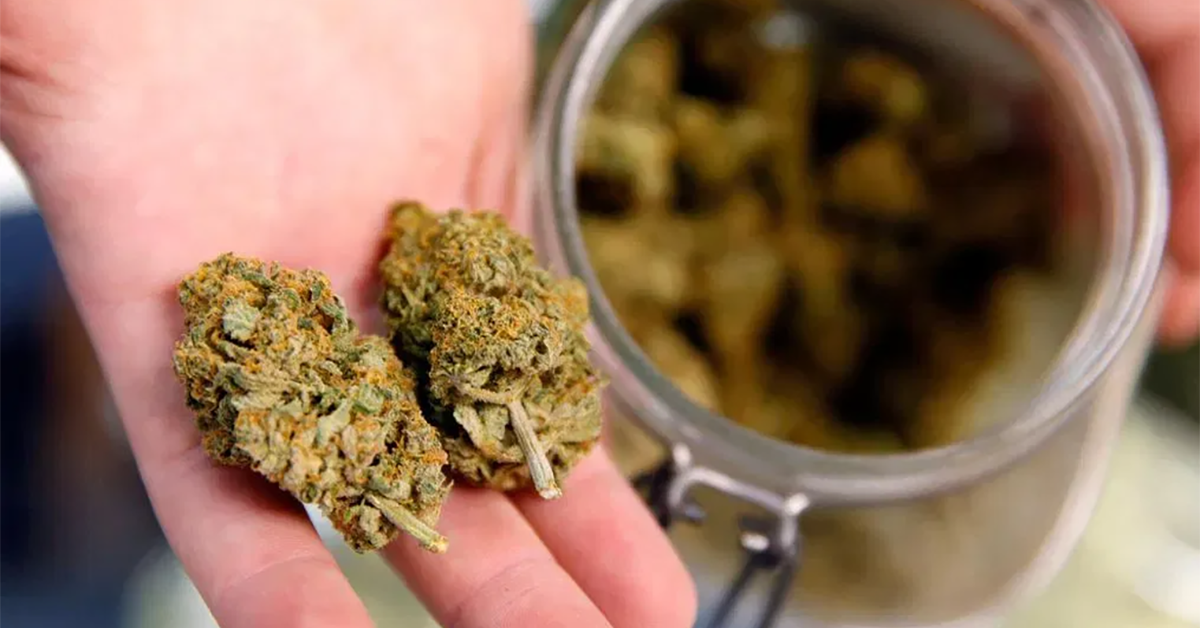Bad Axe Weighs Legalization Impact: Marijuana Facilities on Council Agenda

The Bad Axe City Council is set to make a pivotal decision regarding the approval of marijuana facilities within the city limits. This decision will be made during their meeting scheduled for Monday, November 20th at 6:30 p.m.
Discussions about amending the city's marijuana ordinance reemerged in early 2022. This was initiated by a decision of the city council, permitting then-Police Chief David Rothe and the current Police Chief Shawn Webber to study the approaches of other municipalities and areas in integrating marijuana facilities and businesses into their communities.
City Manager Rebecca Bachman highlighted the significance of this upcoming decision. "This is asking the council if they want to allow these establishments to come to the city of Bad Axe," she stated. Bachman also mentioned that a draft ordinance is prepared, but the council's approval is essential before moving forward with the planning commission.
The legalization of recreational marijuana in Michigan occurred in 2018, following the passage of Proposal 1. However, in Bad Axe, the proposal was narrowly defeated, with 541 votes against and 534 in favor. Similarly, the broader county mirrored this opposition, with 8,261 votes against and 5,479 in favor, except for the city of Caseville, which voted in favor of the ordinance (190-179).
Chief Webber shared insights from his research into other municipalities. He noted that tax revenue from marijuana facilities substantially exceeded that from other businesses. Regarding crime rates, Webber recalled conversations with officers from Bay County, where incidents related to marijuana facilities were minimal, described as a "small blip on their radar." He acknowledged a few break-ins at such facilities across Michigan but emphasized these were infrequent and did not significantly impact local crime rates.
Since the legalization in 2018, various locales such as the city of Caseville and Oliver Township have enacted medical marijuana ordinances. Sebewaing Township has an ordinance for growing. In contrast, the city of Bad Axe voted in 2019 to ban marijuana facilities, a stance it has reaffirmed twice since.
Three Oaks Village Council Pauses Marijuana Business Approvals for Ordinance Review

On November 8th, the Three Oaks Village Council, during its regular meeting, unanimously decided to implement a temporary halt on issuing new licenses, authorizations, and special land use permits related to the sale or dispensation of marijuana. This decision affects dispensaries, marijuana retailers, and similar businesses under Village Ordinances No. 219 and No. 221, as well as the Zoning Ordinance. The aim is to pause these activities while the village makes necessary adjustments to the relevant ordinances.
This moratorium, an amendment to Title 11 concerning Business Regulations, is scheduled to remain in effect until March 20th, 2024, at the latest. Village President Richard Smith clarified that this pause would apply to both retail license applications and special land use permits.
Council member Tyler Ream emphasized the purpose of this action, stating, "We're taking a pause on accepting applications so that we can make a few tweaks to our ordinance." To this, council member Joe Hinman added the importance of also considering zoning changes. Hinman, who previously expressed support for removing the cap on retail licenses, acknowledged that such changes require time to implement.
Smith suggested that the village might be ready to proceed with new regulations sooner than expected, possibly even as early as the following month, though this was speculative.
The ordinance amendment language highlights that currently, Three Oaks has one open license for a marijuana retailer/medical marijuana provisioning center under Village Ordinances No. 219 and No. 221. With multiple entities interested in this license, the village is reviewing and preparing to vote on significant amendments to these ordinances and the Village Zoning Ordinance. The amendments in consideration include, but are not limited to, the number of marijuana retailers and/or medical marijuana provisioning centers allowed to operate in the village. The decision to pause application acceptance is to ensure these matters are adequately resolved before proceeding with new applications under the said ordinances.
Michigan Launches New Cannabis Programs to Support Veterans

The Cannabis Regulatory Agency (CRA) of Michigan has recently announced the introduction of two new programs focused on supporting veterans in the state: Task Force 1620 and the Veteran Recognition Program. These initiatives are designed to aid Michigan's veteran community in accessing cannabis and to highlight veteran-owned cannabis businesses within the state.
Task Force 1620: Aiding Veterans' Access to Cannabis
Task Force 1620 is a program that acknowledges CRA licensees who have established programs to offer safe and affordable cannabis access for veterans. This initiative is designed to connect Michigan's veterans with cannabis retailers who are willing and able to assist. Retailers participating in Task Force 1620 have the autonomy to set the specifics of their veteran access program. This includes determining the maximum amount of cannabis donated or discounted per veteran, establishing eligibility criteria based on the percentage of disability, deciding on the frequency and quantity of donations, and setting the number of veterans included in the program.
Licensees who implement a veteran access program that offers cannabis to veterans at a discounted rate of 75-100% are eligible for Task Force 1620. Approved participants in this program will have their business information and details of their veteran access program published on the CRA's webpage. Additionally, they will receive a seal that they can display at their facility, signifying their involvement and commitment to veteran support.
This program is available to all businesses licensed under both the Medical Marijuana Facility Licensing Act (MMFLA) and the Michigan Regulation and Taxation of Marijuana Act (MRTMA). Importantly, to participate in Task Force 1620, a business does not need to be majority-owned by a veteran. Businesses interested in joining Task Force 1620 are encouraged to apply through the CRA website and can direct their questions to [email protected].
Veteran Recognition Program: Highlighting Veteran-Owned Businesses
The Veteran Recognition Program (VRP) is another initiative by the CRA, focusing on recognizing those CRA-licensed businesses that are majority-owned by veterans of the US armed forces. Upon approval to be part of the VRP, businesses will receive a recognition letter and a seal from the CRA. The program uses the ownership structure provided during the licensing application or amendment process to determine the percentage of veteran ownership. Businesses that meet the criteria and are approved will have their name and license number listed on the CRA website.
The VRP is open to businesses licensed under both the MMFLA and the MRTMA. To apply, businesses should visit the CRA website. Inquiries regarding the Veteran Recognition Program can be directed to [email protected].
Personal Commitment and Support
Brian Hanna, the CRA Executive Director and a former captain in the US Army Reserve, shared his personal connection to these initiatives. Hanna, who served from 2006 to 2012 and was awarded the Bronze Star Medal and the Combat Action Badge during his 2010-2011 deployment to Afghanistan, emphasized his understanding of the challenges faced by veterans returning to civilian life. He noted that cannabis has been beneficial for many veterans in managing PTSD symptoms and reducing reliance on potent, addictive painkillers.
Echoing this sentiment, Anton Harb Jr., a disabled Iraq combat veteran and founder of the Veteran Access Program in Michigan, commended the CRA for its commitment. He highlighted that support for veterans was a central element of the ballot proposal when Michigan voters legalized cannabis in 2018. Harb expressed pride in Michigan's leadership in providing these supportive programs for veterans.
In summary, these new programs by the CRA are a significant step towards supporting Michigan's armed services veterans, offering both improved access to cannabis and recognition of veteran-owned businesses in the cannabis industry. Through Task Force 1620 and the Veteran Recognition Program, the CRA aims to make a meaningful difference in the lives of veterans in Michigan, acknowledging their service and addressing their specific needs in accessing cannabis.
How Rescheduling Marijuana Could Change Access and Affect State Dispensaries

The potential reclassification of marijuana from Schedule 1 to Schedule 3 in the Controlled Substances Act could significantly enhance access and diversify the range of products available for medical marijuana patients. However, this change is not expected to directly influence the functioning of state-regulated medical marijuana (MMJ) dispensaries.
Amy Rubenstein, a partner at the international law firm Dentons, emphasizes that shifting cannabis to Schedule 3 would primarily open up avenues for its inclusion in the marketplace through FDA-approved drug channels. This move would facilitate the development of cannabis-based pharmaceuticals and their subsequent approval by the U.S. Food and Drug Administration. Once these drugs receive FDA clearance, they could be dispensed via federally licensed pharmacies upon prescription.
However, Rubenstein points out that the process of drug development, including necessary studies and obtaining FDA approval, is a lengthy one. Consequently, it will be some time before marijuana-based drugs are available in pharmacies. In the meantime, medical marijuana patients can still procure regulated cannabis products from state-licensed dispensaries.
This rescheduling could also provide a layer of security for state-regulated recreational marijuana retailers, reducing the fear of federal intervention, as per industry observers.
"The state-legal markets are not going to disappear," asserts Rubenstein.
Echoing this sentiment, Justin Brandt, a partner at the Scottsdale, Arizona-based law firm Bianchi & Brandt, foresees the eventual availability of medical marijuana products in pharmacies. However, he cautions that attaining FDA approval under Schedule 3 status involves rigorous clinical trials and procedures akin to those undertaken by large pharmaceutical companies—a process both costly and time-consuming.
As for marijuana in its flower form, experts anticipate that the FDA is unlikely to approve combustible products. Vince Ning, CEO of California marijuana distributor Nabis, envisions a future where marijuana might be sold in pharmacies, but likely in non-combustible formats such as pills or medical-grade concentrates.
"I just don't see a pharmacy or a Kaiser Permanente selling cannabis flower," Ning remarks, adding that he hopes for the expansion of direct-to-consumer channels and greater access overall to combat the illicit market. Despite these potential changes, Ning believes dispensaries will continue to play a vital role.
Detroit Expands Cannabis Landscape with Latest Licensing Round

Detroit's burgeoning recreational marijuana sector marked a significant milestone as the city's Office of Marijuana Ventures and Entrepreneurship announced a fresh wave of licenses, bringing new retail, microbusiness, and consumption lounge establishments to the forefront. This development underscores Detroit's continued commitment to fostering a diverse and equitable cannabis industry.
In a competitive application process, 37 out of 65 applicants were awarded licenses to commence operations in various facets of the marijuana business. Notably, the majority of these licenses were allocated for recreational marijuana dispensaries, demonstrating the growing demand and acceptance of cannabis in the city. Additionally, one applicant received the green light to open what could be Detroit's first-ever marijuana consumption lounge, a concept gaining traction in various parts of the country.
Kim James, the director of the Office of Marijuana Ventures and Entrepreneurship, applauded the recipients for their potential and dedication to uphold the city's core values concerning diversity and equity. In a significant nod to inclusivity, 13 of the licensed businesses are majority African American-owned, five are predominantly women-owned, and 21 have Detroit residents as majority owners.
This new wave of licensing follows almost a year after Detroit's initial announcement of 33 businesses receiving recreational marijuana licenses. This progress marks the culmination of a lengthy and complex effort by the city to distribute these coveted licenses. Detroit had to navigate numerous legal challenges as it sought to establish a fair licensing process, particularly emphasizing "equity applicants." These applicants typically represent individuals from communities historically affected by marijuana prohibition and enforcement, including those with certified Detroit Legacy status residing in Detroit or other similarly impacted areas.
Since recreational marijuana became available for purchase in Detroit in early January, the city now boasts 31 operational recreational marijuana retailers. The economic impact of this burgeoning industry is underscored by the imposition of a 10% state excise tax on recreational marijuana products. The Michigan Department of Treasury is expected to announce early next year the allocation of this tax revenue to Detroit, marking the city's first receipt of funds from the Marihuana Regulation Fund. During Michigan's 2023 fiscal year, marijuana tax revenue amounted to a substantial $266.2 million.
April 2022 marked the beginning of Detroit awarding unlimited licenses for activities such as cannabis cultivation and processing, further expanding the industry's scope. In this latest round of licensing, four applicants were granted provisional certificates to open consumption lounges, and two others for microbusinesses, contingent upon securing a property within 18 months—a process in which the city has pledged support.
Before commencing operations, these newly licensed businesses must obtain final approvals from the state of Michigan, a crucial step towards actualizing their business plans.
The announcement of these new licenses is a clear indication of Detroit's ongoing efforts to create a robust, diverse, and equitable recreational marijuana market, reflecting the city's broader goals of economic growth and inclusivity. As this industry continues to evolve, Detroit positions itself as a key player in the ever-expanding landscape of the legal cannabis market.
Ohio Legalizes Recreational Marijuana: Insights from Michigan's Cannabis Industry

The recent legalization of recreational marijuana in Ohio, a decision made through the affirmative vote on Issue 2, marks a significant shift in the Midwest's approach to cannabis. This development, which was a pivotal issue on the election day, is not only reshaping Ohio's stance on marijuana but is also casting light on neighboring states, particularly Michigan.
In Morenci, Michigan, a border town near Ohio, the economic ripple effects of this decision are palpable. Dispensaries in the area have been instrumental in contributing to local economies, a trend observed by employees within the cannabis industry. Their insights offer a unique perspective on the future of cannabis in both states.
April Clark, the general manager at Ascend, a Morenci-based dispensary, shares her thoughts on the evolution of the cannabis industry. Despite Ascend's clientele including a significant number of out-of-state visitors, Clark remains optimistic about the impact of Ohio's new legislation on her business. She believes that Ohio's move to legalize recreational marijuana is a testament to the industry's positive trajectory. "It's really exciting," Clark comments. "It says a lot about where the industry is going. It's done great things for Michigan, so we're excited to see how that affects Ohio as well."
Clark's journey into the cannabis sector is a personal one. Initially indifferent to marijuana, her perception changed after witnessing its beneficial effects on a family member struggling with anxiety. This experience led her to delve into the world of cannabis, observing a significant shift in public perception. "I think a lot of people understand that it is a form of medicine and helps with various issues, from anxiety and pain management to depression, in addition to its recreational uses," Clark explains.
Contributing to this evolving narrative is Heath Alty, currently training under Clark to become the lead supervisor at an upcoming Ascend dispensary in Sandusky, Ohio. Alty, a medical marijuana patient himself, echoes the sentiment about the shifting perceptions of cannabis. He acknowledges the plant's benefits, especially as an alternative to more conventional medications like opiates. Alty was not taken aback by the support for Issue 2, stating, "We kinda had this idea that it would pass, it's just the way things are going now."
Alty's anticipation for the cannabis industry's future in Ohio is palpable. He looks forward to the opportunities that will arise from offering both medicinal and recreational products. His enthusiasm extends beyond the business aspect, as he is eager to assist customers in exploring the benefits of cannabis.
Ohio's decision to legalize recreational marijuana is more than a policy change; it's a reflection of changing attitudes, scientific research, and an acknowledgement of cannabis's multifaceted benefits. As individuals like Clark and Alty contribute their experiences and expectations, the narrative around cannabis continues to evolve, shaping a future where marijuana is recognized not just as a recreational substance, but also as a valuable medicinal alternative. The impact of Ohio's decision on neighboring states like Michigan will be closely watched as the cannabis industry enters this new era.


 Helpful Links
Helpful Links